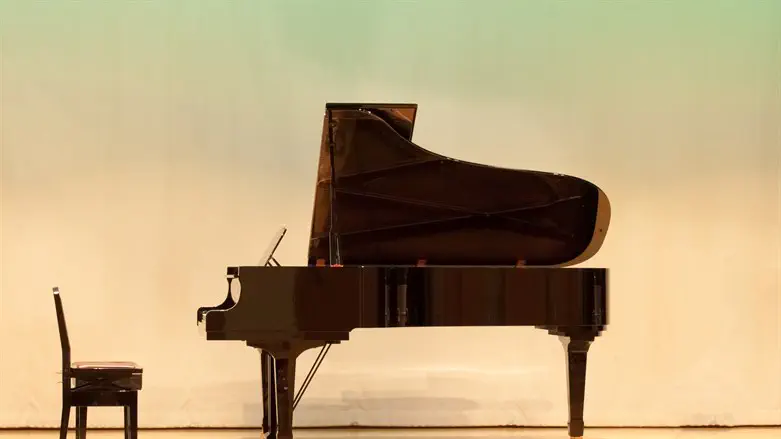
One of the most interesting phenomenon taking place in Israel is seeing haredi women gradually moving into fields they have rarely or never explored before, developing individual talents and interests, and doing so confidently, without changing their devotion to family values or overstepping the parameters of Torah-true life. Perhaps these women are motivated by study and training opportunities that have opened up before them, perhaps by other religious women's accomplishments, perhaps because today's modern households leave enough time for women to work on their own initiatives. Whatever the reason, slowly but surely, a wide range of creative activity is now being explored by haredi women.
One prototypal group is Bereshit, a haredi all-female band, whose recent show opened to a sellout audience at the au courant Khan Theatre in Jerusalem, with the rhythmic beat of American jazz. Their arrangement of Marcus Miller’s ‘Blast’, with the addition of Purim verses, had the all-women’s audience tapping their feet and swaying in time to this modern jazz number.
Yes, this was an all-women’s event: the performers, the audience, even the sound person and the photographer. It is this stringency which differentiates Bereshit from other women's bands. It is comprised of three haredi women who decided on principle to perform in accordance with strictest halakhic rulings. After consulting with their rabbi, they decided that in addition to not appearing before men, a rule followed by many observant women, they would also go one step further and avoid having a frontal view of their faces shown in the media and pr campaigns.
Members of the band write and compose original music inspired by Jewish prayers, the Jewish calendar and the broad mosaic of Jewish culture, especially one’s personal relationship with the Creator. To quote one of the composers, the concert takes the listener on a ‘musical journey’ touching on the highs and lows of the Jewish woman’s life.
At the same time, Bereshit intersperses the music with its own renditions of popular hits such as Stand By Me and No Woman, No Cry. The result is a scintillating mix moving between the old and the new, and always with a Jewish theme.

Keren Moshe, aged 40, is the official soloist and percussionist. She grew up in Mevasseret Zion and began singing in a choir which represented Israel abroad from the fifth grade. Later, she took part in the IDF Central Command’s musical ensemble and went on to study at the Rimon School of Music.
Rachel Bergman, the pianist, is 40 years old She grew up in Ramat Gan in a musical environment where concerts were held in her home. She studied classical music at the Tel Aviv Conservatory, but always loved to play jazz and pop music.
Yael Elkayam, aged 42, is a guitarist. As a teenager she learned both piano and guitar and played in a band in school and in the army. She married at the age of 25 and music, at that stage, took a back seat. Then a few years ago she took a workshop with Etti Ankri, a famous Israeli singer who is also a baal teshuva, and this opened the door to songwriting and composition.
Some time later Yael met Keren and Racheli – while their children were in the local playground – and Bereshit was formed.
Keren comes from a secular background and became religiously observant at the age of 23, together with her husband, while living in New York. Yael grew up in a traditional home and became fully observant together with her husband after they met in India. Racheli comes from a haredi home but, nevertheless, grew up on the Beatles. She often introduces Keren and Yael to songs hitherto unknown to them. Keren was always attracted to black music while Yael, like Racheli, was deeply influenced by the Beatles, and also by Leonard Cohen.
In Keren’s words: "It is because of our varied backgrounds that we make every effort to appeal to women across the board: haredi, national religious, traditional and secular alike.”
“The songs selected for each performance, apart from our original compositions, ‘pop up’ spontaneously. We then proceed to give each song our own stamp – as in the song ‘Stand By Me.'
(translated Hebrew Lyrics:by :Keren Moshe):
‘When it’s cold and sad and the world seems bad,
And I twist and turn within myself,
You will protect me
Because You are with me
‘Thy rod and Thy staff , they comfort me’
It is not always so simple. One of the band’s first shows was at Beth Hayotzer, Tel Aviv, an evening featuring an all female line-up. When discussing the date of the show, the band realized that Racheli, who was pregnant, was due to deliver close to that date. Should they make alternative arrangements? The show must go on after all!
On the day of the performance, Racheli had yet to show any sign of going into labor, but she decided to wait until the last moment at home and contractions began, then stopped. She packed her hospital bag and left with her husband for the show. Tension ran high, the band performed and Racheli gave no hint of the imminent new arrival. In the event, a beautiful healthy baby came into the world the following morning.
Such is the women’s devotion to performing their work.
‘”We are no longer young girls," says Yael, “so we are in a very mature place when it comes to performing. We don’t dream of stardom. We simply want to bring our work to the outside world and make other women happy. We are in G-d’s hands, but our success also depends on our own personal endeavour – hishtadlus in Hebrew. The Creator, blessed be He, gave us the ability to sing and make music so we go forward together with Him, try to realize His wishes, and to touch the hearts of our audience.”
Where next will we find haredi women of valor?